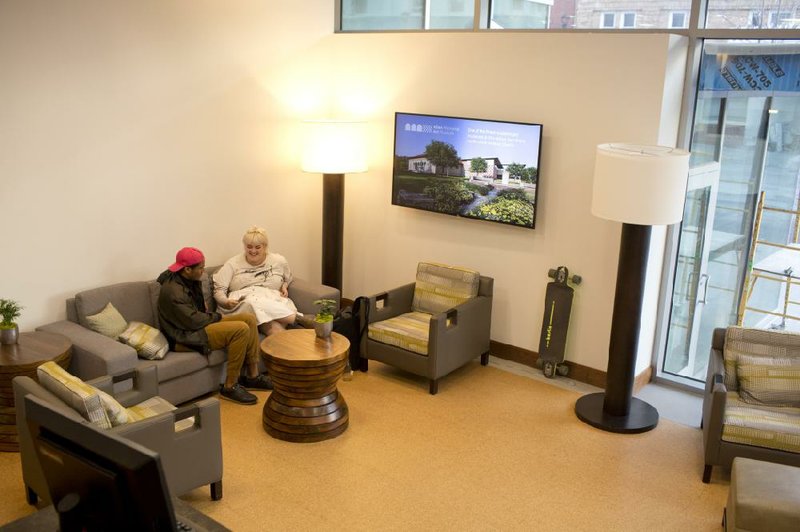Before Christian Bolles decided on Oberlin College in Ohio three years ago, he and his parents traveled to Oberlin from their home in San Francisco to visit the campus and the town.
It was one of many campuses they toured on their college road trips, where the local accommodations were seldom more than utilitarian. They stayed at the Inn at Oberlin, a 70-room hotel owned by the small liberal arts college and one of the few options in town for overnight guests.
"It was kind of outdated and tattered around the edges," Christian's father, Gary Bolles, recalled.
"That's just part of the process," he said. "It's what you expect when you're looking at colleges."
Or at least it used to be. Oberlin, like many other colleges and universities around the country, has decided that campus guest quarters, instead of perfunctory, can become pampering places that help promote the institution's brand and image.
In September, when Gary Bolles and Christian's mother, Heidi Kleinmaus, went to visit their son, now a third-year archaeology student, they were delighted to find the newly opened Hotel at Oberlin. The college developed it with the help of Smart Hotels, a company specializing in the new wave of campus lodging.
"It was just a complete surprise to find such world-class accommodations," Gary Bolles said. "The college obviously put tremendous thought into every detail, from the booking, to the front desk, to the food in the restaurant."
Oberlin is far from unique. Whether it is other small liberal arts colleges like Swarthmore in Pennsylvania or big universities like Florida State, campus hotels are joining the lodging big leagues.
"In the last few years everything has been changing -- people are showing they're willing to pay for quality and style" when looking for overnight accommodations during a college visit, said John O'Neill, a professor at Penn State University and director of the Center for Hospitality Real Estate Strategy there.
"It ties into the boutique hotel movement," O'Neill said. "The economy has something to do with it. And the psychographics of guests has a lot to do with it."
Those guests include not only parents and high school seniors but also visiting alumni, lecturers and artists, as well as sports teams and fans who buy tickets to watch those sports teams.
According to a study by Pinnacle Advisory Group, a Boston firm specializing in hotel asset management, more than 80 American colleges and universities owned hotels in 2014, and an additional 14 were being planned or under construction.
But the schools themselves are not the only ones building college hotels. Smart Hotels, in Cleveland, and Graduate Hotels, in Chicago, are among the private developers constructing their own hotels to serve campuses.
Since its start in 2014, Graduate has opened six college hotels, which average 150 rooms and can run from $125 on a weeknight to $500 a night on a busy football weekend. The Graduate hotels are in Ann Arbor, near the University of Michigan; in Charlottesville, close to the University of Virginia; Madison, near the University of Wisconsin; Tempe, neighboring Arizona State University; Athens, home of the University of Georgia; and Oxford, near the University of Mississippi.
Graduate plans to have 20 hotels near colleges or universities by 2019.
Smart, in business since 2010, has opened three -- near the University of Chicago, Duke University in Durham, N.C., and Emory University in Atlanta -- with six others on the way.
And as the number of college hotels increases, so does their quality. Witness the Hotel at Oberlin.
The 70-room complex, the result of more than five years of planning at the college, was designed to be one of the most environmentally sustainable hotels in the world. It has earned platinum-level status under the Leadership in Energy and Environmental Design certification system used by the U.S. Green Building Council.
Even guests who might be oblivious to the hotel's solar, geothermal and radiant cooling and heating systems might have trouble overlooking amenities that chain hotels would not think to offer for rooms starting at $129 a night.
For example, soap dishes in each room are made by a local glassblower. Shampoos and lotions are locally produced and made with all-natural ingredients. And the food at 1833 Restaurant, the hotel's dining facility, is locally grown as much as possible.
Like other colleges that have ventured into the hospitality industry, Oberlin may be less concerned about the hotel's profitability than with the image it projects.
"I think what we're seeing is a lot of schools realizing that a hotel is a useful amenity in terms of providing a comfortable place for stakeholders and particularly alumni," said Matthew Arrants, Pinnacle Advisory Group's executive vice president. "You want your alumni to come back so you can continue ties with them."
Sara Masterson, vice president of hotel management at the Olympia Cos., said her company has made a specialty of running college hotels in recent years, as the niche has developed.
In addition to the Hotel at Oberlin, Olympia runs the Alfond Inn in Winter Park, Fla., which is owned by Rollins College, and the Inn at Swarthmore, which opened this year.
"We know what the college's brand represents and the fabric of their story," Masterson said. "Colleges have figured out that a hotel can serve as the front door and the back door for prospective students."
SundayMonday Business on 11/27/2016
